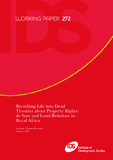Ensuring a future for collective forestry in China's southwest: Adding human and social capital to policy reforms
Analyzing community-based forestry: Local, political and agrarian perspectives
To resolve certain Native American claims in New Mexico, and for other purposes [microform]report (to accompany S. 1773)
Analytical approach for analyzing and providing solutions for the conflicts among forest stakeholders across Turkey
Forest conversion to rubber around Sumatran villages in Indonesia: Comparing the impacts of road construction, transmigration projects and population
Subdividing the Commons: The Politics of Property Rights Transformation in Kenya’s Maasailand
This paper discusses the internal processes and decisions that characterized thetransition from collectively held group ranches to individualized property systems amongthe Maasai pastoralists of Kajiado district in Kenya. It addresses the question of whygroup ranch members would demand individualized property systems, but then turnagainst the outcome.
Background report: Kurunegala, Sri Lanka
This project is funded by the European Commission under its Asia Pro Eco II Program. It is undertaken by the International Water Management Institute (IWMI), Sri Lanka; COSI, Sri Lanka; the International Water and Sanitation Centre (IRC), the Netherlands; NGO Forum for Drinking Water Supply and Sanitation, Bangladesh; and the Stockholm Environment Institute (SEI), Sweden.
The Effects of Changing Technology: The Impacts of a Changing Cost Structure on Land Tenure Arrangements in the Mississippi Delta, 1996 - 2004
Genetically modified (GM) cotton varieties have changed many aspects of cotton production in the United States. The advent of GM varieties has fueled the ongoing trend of increasing farm size and fewer farmers. Mississippi is no exception to this trend. The rapid adoption of GM cotton varieties in Mississippi has allowed some producers to increase the acreage of their farming operation.
Using GIS to measure changes in the temporal and spatial dynamics of forestland: experiences from north-west Spain
Forestry variables are usually calculated at a forest management unit scale. However, a region's forestry sector is affected by various other factors that interact over space and time, many of which are not directly associated to silvicultural activities but nonetheless play an important part in its development from a socio-economic or environmental point of view.
Survey of Weed Management in Peanut (Arachis hypogaea L.) Fields in Southern Ghana, West Africa
Breathing Life into Dead Theories About Property Rights: De Soto and Land Relations in Rural Africa
Presumption of a direct causal link between formalisation of property rights
and economic productivity is back on the international development agenda.
Belief in such a direct causal relationship had been abandoned in the early
1990s, following four decades of land tenure reform experiments that failed to


